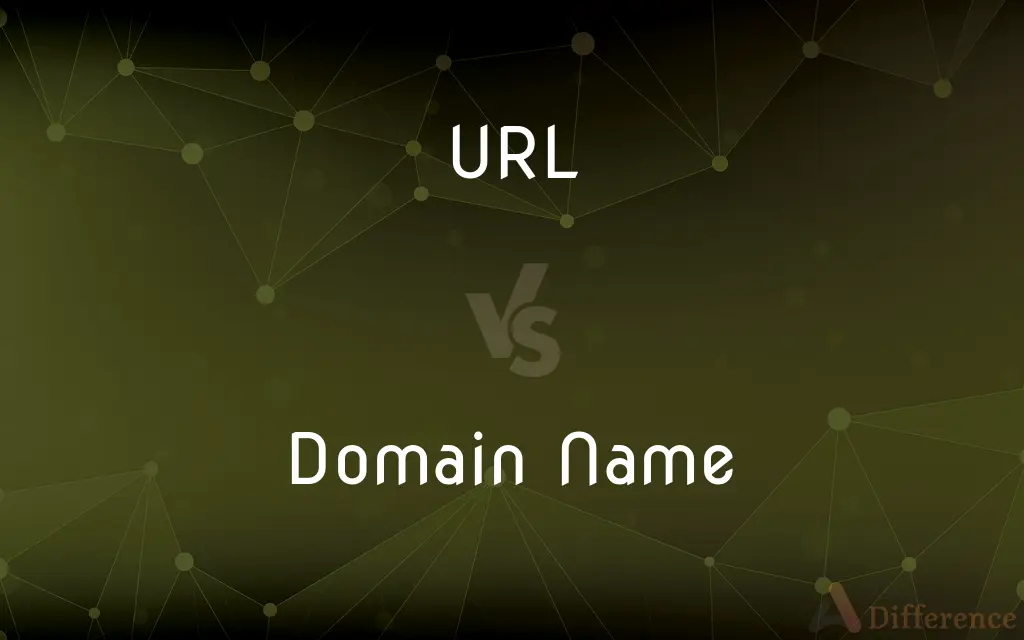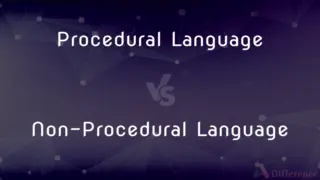URL vs. Domain Name — What's the Difference?
By Tayyaba Rehman — Published on January 8, 2024
URL (Uniform Resource Locator) is a complete web address specifying the location of a resource. Domain Name is a part of a URL indicating a website's name/address.

Difference Between URL and Domain Name
Table of Contents
ADVERTISEMENT
Key Differences
URL, or Uniform Resource Locator, encompasses the complete web address, specifying the protocol, domain name, and specific resource. Domain Name, within a URL, signifies the unique name that identifies an internet entity.
In a URL, the Domain Name serves as the human-readable label for a web address, identifying the location of resources online. Meanwhile, a URL encompasses various elements like the protocol, domain name, path, and resource.
The Domain Name, typically part of a URL's structure, provides an identifiable name, crucial for navigation and access to specific web resources. URLs, in their entirety, are comprehensive addresses containing specific information on how to access a resource on the internet.
URLs, being complete addresses, comprise different components, including the Domain Name, path, and protocol, enabling precise resource location. Domain Names, specific to the network, serve as easy-to-remember labels for accessing websites within the larger URL structure.
Comparison Chart
Definition
Complete web address specifying resource location
Identifiable part of a URL indicating a website's name
ADVERTISEMENT
Components
Encompasses protocol, domain name, path, and resource
Serves as the human-readable label for web navigation
Role
Provides the complete address for resource access
Identifies a specific internet entity by name
Structure
Consists of multiple parts including the Domain Name
Part of URL structure indicating website identification
Function
Directs to a specific web resource through the address
Acts as a recognizable name for internet navigation
Compare with Definitions
URL
Acts as an address to locate specific online resources.
A URL, akin to an address, leads to specific web pages or files on the internet.
Domain Name
Serves as an identifiable part within a URL's structure.
The Domain Name 'example.com' is a fundamental part of a URL for website identification.
URL
Specifies the complete web address for accessing resources.
A URL like https://www.example.com/page directs to a specific web resource.
Domain Name
Represents unique entities on the internet.
Each Domain Name denotes a unique website or online entity within the internet infrastructure.
URL
Comprises various elements such as protocol and resource path.
A URL contains distinct components like protocol, domain name, and file path for resource access.
Domain Name
Helps users locate websites and online resources.
Domain Names serve as markers, aiding users in finding specific websites or online content.
URL
Includes the Domain Name as part of its structure.
A URL incorporates the Domain Name, like 'example.com,' to direct users to specific web locations.
Domain Name
Provides an easily remembered name for website navigation.
Domain Names simplify web navigation, allowing users to access sites using familiar names.
URL
Enables navigation and access to resources online.
A URL facilitates the identification and access of various resources across the internet.
Domain Name
Identifies websites through a human-readable label.
A Domain Name, like 'example.com,' represents a specific website for user access.
URL
An internet address (for example, http://www.hmhco.com/about-hmh), usually consisting of the access protocol (http), the domain name (hmhco.com), and optionally the path to a file or resource residing on the server where the domain name resides (about-hmh).
URL
The address of a web page on the world wide web
Common Curiosities
Is a Domain Name the same as a URL?
No, a Domain Name is part of a URL, indicating the name/address of a website within the complete URL structure.
How does a URL function?
A URL functions as an address providing the precise location of a resource on the internet, allowing access through web browsers.
Can a Domain Name change?
Yes, Domain Names can be changed or transferred between owners but require specific procedures and domain registrars' involvement.
What does a URL contain?
A URL comprises various elements like the protocol (https://), domain name (example.com), path (/page), and resource name.
Can a URL contain spaces?
No, spaces are not allowed in URLs; they are replaced with characters like %20 for compatibility in web addresses.
How are Domain Names registered?
Domain Names are registered through accredited domain registrars, where individuals or organizations purchase and maintain their website identities.
Are Domain Names case-sensitive?
In most cases, Domain Names are not case-sensitive, meaning uppercase and lowercase letters are treated identically.
Can a URL be used to access any file on the internet?
A URL can be used to access various resources, including web pages, files, images, videos, and more, if the resource is publicly available.
Can a URL redirect users to another website?
Yes, URLs can be set up for redirection, directing users from one URL to another specified address.
What is the purpose of the resource path in a URL?
The resource path in a URL specifies the location of a specific file or page within a website, directing users to the desired content.
Can a Domain Name contain special characters or symbols?
In general, Domain Names only allow alphanumeric characters and hyphens but do not permit special characters or spaces.
What is the significance of the protocol in a URL?
The protocol (HTTP/HTTPS) in a URL defines how information is transmitted between a web server and a browser, ensuring secure communication.
How does a URL facilitate navigation on the internet?
URLs act as navigational guides by providing specific addresses for web resources, enabling users to access and locate information across the internet.
How do Domain Names help in website branding?
Domain Names play a crucial role in branding by representing a website's identity, enhancing recognition and recall among users.
Can a Domain Name be a combination of numbers and letters?
Yes, Domain Names can consist of a combination of alphanumeric characters, including numbers and letters.
Share Your Discovery

Previous Comparison
Procedural Language vs. Non-Procedural Language
Next Comparison
Circuit Switching vs. Packet SwitchingAuthor Spotlight
Written by
Tayyaba RehmanTayyaba Rehman is a distinguished writer, currently serving as a primary contributor to askdifference.com. As a researcher in semantics and etymology, Tayyaba's passion for the complexity of languages and their distinctions has found a perfect home on the platform. Tayyaba delves into the intricacies of language, distinguishing between commonly confused words and phrases, thereby providing clarity for readers worldwide.














































